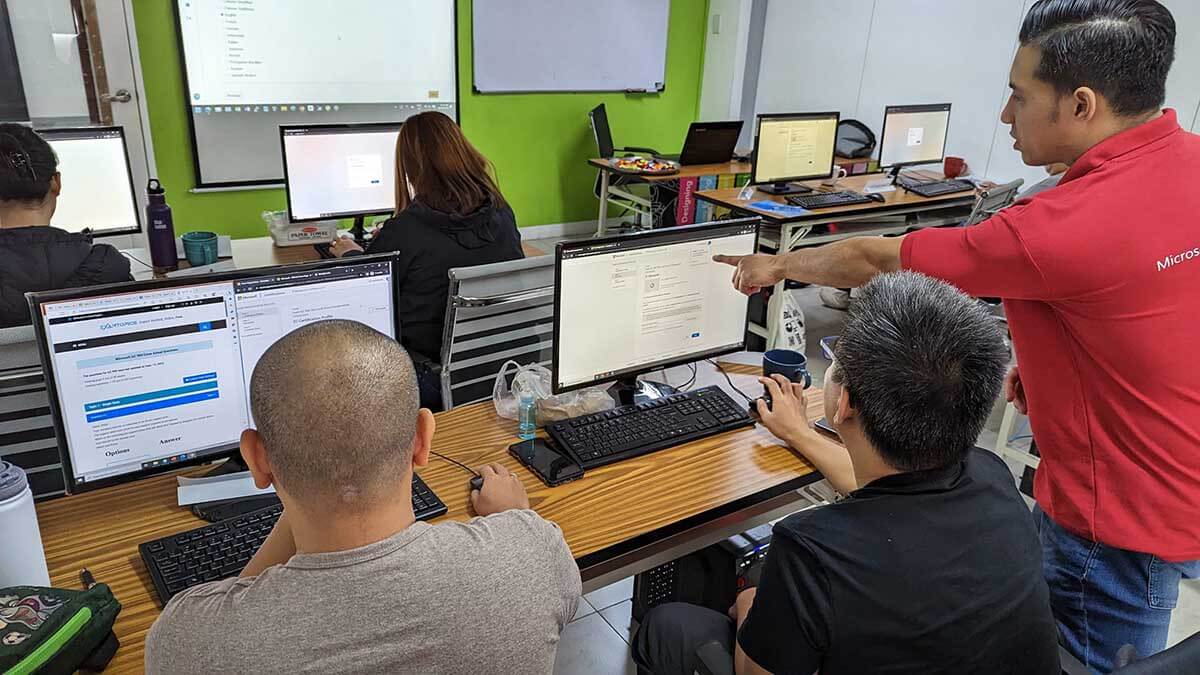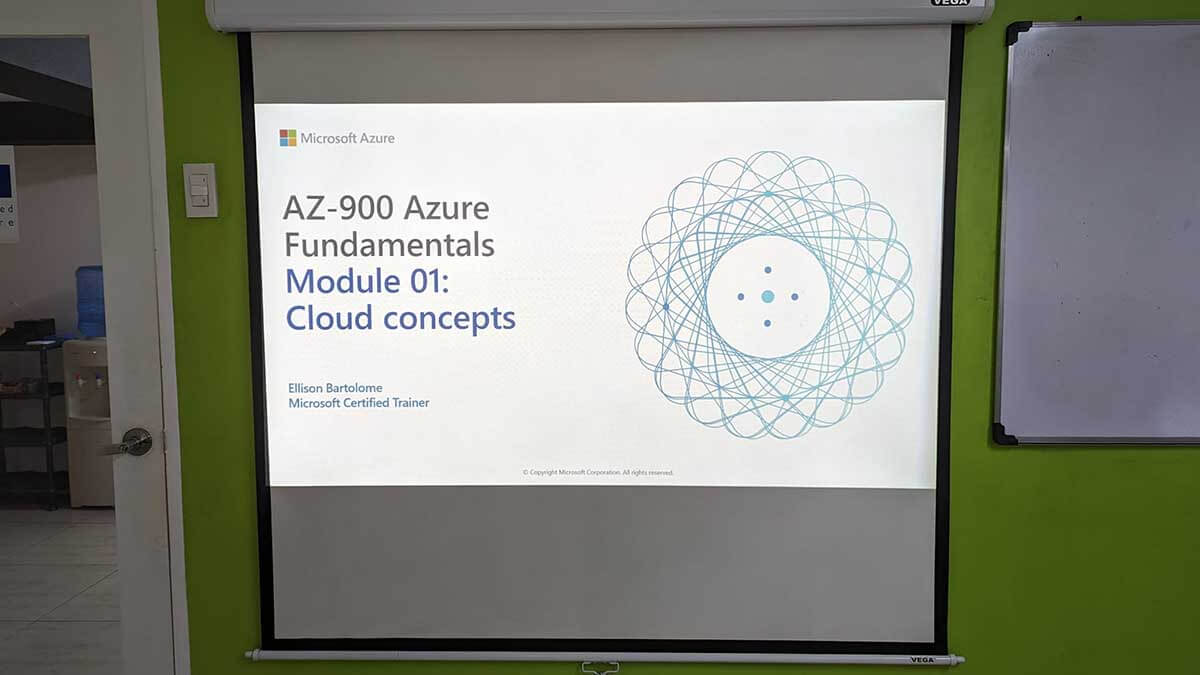Microsoft Azure Fundamentals
Certification Exam: AZ-900

Course Overview
Microsoft Azure fundamentals training Philippines! Gain a solid understanding of Azure’s core concepts, including cloud computing basics, virtualization, and Azure services. Master essential skills to deploy, manage, and scale applications in the Azure cloud environment.

















What Makes Inventive Media Stand Out from the Competition!
- Taught exclusively by Microsoft Azure Certified Trainers!
- Unlimited Free Class Retakes for Unlimited Learning
- Pearson Vue Accredited Testing Center
- PhilGEPS Accredited Center
- Free Trainer Consultation
- Globally Recognized Course Certificate
Frequently Asked Questions
- Familiarity with cloud computing is helpful but isn’t necessary.
- Understanding of network configurations, including TCP/IP, Domain Name System (DNS).
- Certificate of course completion
- Training references (PDF)
- Exercise materials
- Some add-ons
- Free trainer consultation
- Online mock-up exam
- Unlimited Free Retakes
Unlimited Retakes = Unlimited Hours of Learning!
We understand that individuals have different learning styles and paces, that’s why we offer the opportunity to learn at your own speed. If you need more time to grasp a concept, you are welcome to come back and retake the class at no additional cost. We believe in providing students with the support they need to succeed.
To Avail: Finish the course to qualify for the unlimited refresher classes
Validity: 1 Year
Beginners – Individuals new to cloud computing and Azure.
IT Professionals – Those looking to expand their cloud knowledge and skills.
Developers – Professionals aiming to understand Azure for app development.
Students – Learners pursuing a career in cloud technology.
Business Stakeholders – Managers and decision-makers seeking to understand Azure’s benefits.
Career Changers – Individuals transitioning into cloud-related roles.
Yes we do! Each student shall be provided access to an actual paid Azure subscription/account during the 2 days training.
The course fee covers only the Microsoft Azure Fundamentals training program, but please note that the Certification Exam is not included. You can register and pay for the exam separately through the Pearson website once you are ready to take the test.
If you wish to earn your certification upon course completion, you will need to register and pay for the Certification Exam through the Pearson VUE website.
As an accredited Pearson VUE Testing Partner, Inventive Media is available as a convenient testing location for your exam.
📌 Microsoft Azure Fundamentals (AZ-900) Certification Exam Fee: $50 USD
Course Outline
Module 1: Cloud Concepts
In this module, you’ll take an entry level end-to-end look at Azure and its capabilities, which will provide you with a solid foundation for completing the available modules for Azure Fundamentals.
Lessons
- Introduction to Azure fundamentals
- Fundamental Azure concepts
After completing this module, students will be able to:
- Understand the benefits of cloud computing in Azure and how it can save you time and money.
- Explain concepts such as high availability, scalability, elasticity, agility, and disaster recovery.
Module 2: Core Azure Services
In this module, you learn about core Azure services like Azure database, Azure compute, Azure storage, and Azure Networking.
Lessons
- Core Azure architectural components
- Core Azure workload products
- Azure networking services
- Azure storage services
- Azure database services
After completing this module, students will be able to:
- Describe core Azure architecture components such as subscriptions, management groups, and resources.
- Summarize geographic distribution concepts such as Azure regions, region pairs, and availability zones.
- Understand the services available in Azure including compute, network, storage, and databases.
- Identify virtualization services such as Azure VMs, Azure Container Instances, and Azure Kubernetes.
- Compare Azure’s database services such as Azure Cosmos DB, Azure SQL, and Azure Database for MySQL.
- Examine Azure networking resources such as Virtual Networks, VPN Gateways, and Azure ExpressRoute.
- Summarize Azure storage services such Azure Blob Storage, Azure Disk Storage, and Azure File Storage.
Module 3: Core Solutions
In this module, you’ll learn about AI machine learning, Azure DevOps, monitoring fundamentals, management fundamentals, serverless computing fundamentals. and IoT fundamentals.
Lessons
- Choose the best Azure IoT service
- Choose the best AI service
- Choose the best Azure serverless technology
- Choose the best tools with DevOps and GitHub
- Choose the best management tools
- Choose the best Azure monitoring service
After completing this module, students will be able to:
- Choose the correct Azure AI service to address different kinds of business challenges.
- Choose the best software development process tools and services for a given business scenario.
- Choose the correct cloud monitoring service to address different kinds of business challenges.
- Choose the correct Azure management tool to address different kinds of technical needs.
- Choose the right serverless computing technology for your business scenario.
- Choose the best Azure IoT service for a given business scenario.
Module 4: General security and networking features
In this module, you will learn how to protect yourself against security threats, and secure your networks with Azure.
Lessons
- Security Tools and Features
- Secure Network Connectivity
After completing this module, students will be able to:
- Strengthen your security posture and protect against threats by using Microsoft Defender for Cloud.
- Collect and act on security data from many different sources by using Microsoft Sentinel.
- Manage dedicated physical servers to host your Azure VMs for Windows and Linux.
- Identify the layers that make up a defense in depth strategy.
- Explain how Azure Firewall enables you to control what traffic is allowed on the network.
- Configure network security groups to filter network traffic to and from Azure resources.
- Explain how Azure DDoS Protection helps protect your Azure resources from DDoS attacks.
Module 5: Identity, Governance, Privacy, and Compliance
In this module, you will learn about Azure identity services, how to build a cloud governance strategy, and privacy, compliance and data protection standards on Azure.
Lessons
- Core Azure identity services
- Azure Governance Methodologies
- Privacy, Compliance, and Data Protection standards
After completing this module, students will be able to:
- Explain the difference between authentication and authorization.
- Describe how Azure Active Directory provides identity and access management.
- Explain the role single sign-on (SSO), multifactor authentication, and Conditional Access play.
- Make organizational decisions about your cloud environment by using the CAF for Azure.
- Define who can access cloud resources by using Azure role-based access control.
- Apply a resource lock to prevent accidental deletion of your Azure resources.
- Apply tags to your Azure resources to help describe their purpose.
- Control and audit how your resources are created by using Azure Policy.
- Enable governance at scale across multiple Azure subscriptions by using Azure Blueprints.
- Explain the types of compliance offerings that are available on Azure.
- Gain insight into regulatory standards and compliance on Azure.
- Explain Azure capabilities that are specific to government agencies.
Module 6: Azure Pricing and Lifecycle
In this module, you will learn how to plan and manage Azure costs, and how to choose the right Azure services though SLAs and service lifecycle.
Lessons
- Planning and Cost Management
- Azure Service Level Agreements (SLAs) and Lifecycle
After completing this module, students will be able to:
- Use the Total Cost of Ownership Calculator.
- Describe the different ways you can purchase Azure products and services.
- Use the Pricing calculator to estimate the monthly cost of running your cloud workloads.
- Define the major factors that affect total cost and apply recommended practices to minimize cost.
- Describe what a service-level agreement (SLA) is and why SLAs are important.
- Identify factors, such as the service tier you choose, that can affect an SLA.
- Combine SLAs to compute a composite SLA.
- Describe the service lifecycle in Azure.
Premium Experience
- Fully Air-Conditioned Training Rooms
- Workstation for Every Student
- Access to Azure Paid Subscription
- Free Coffee & Fast WiFi
- Lifetime Access to Online Consultations
- Unlimited FREE Class Retakes
Single Course Discount
Group Discount
april 2025
may 2025
About the Registration
Feel free to register! Registering does not commit you to paying for the course immediately. Registration helps us track attendee numbers and enables us to stay in touch. Payment will only be requested once the course is confirmed to proceed.
Note: When choosing a schedule, you are limited to the available training dates posted on our website.